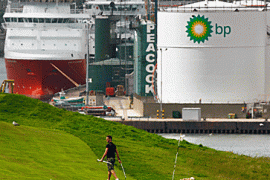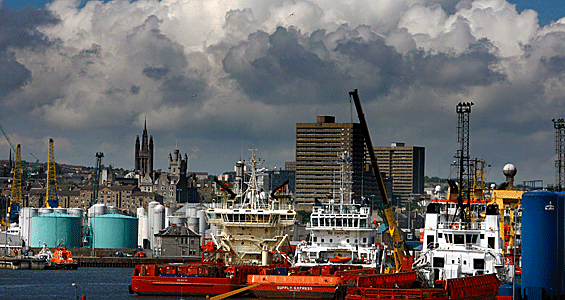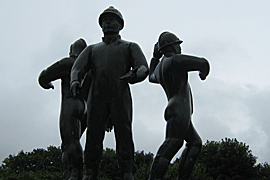Little legacy in Scottish oil boom
Aberdeen moves to hold on to energy riches as output from North Sea oil fields falls.

 |
| The oil boom arrived in the city of Aberdeen in 1975 [Gallo/Getty Images] |
The Scottish city of Aberdeen was transformed from a fishing port to the “energy capital of Europe” after the discovery of North Sea oil along its coastline in the 1970s.
But now the city is demanding a greater share of the riches, and calling for an oil fund to be established before the opportunity runs out.
Keep reading
list of 4 itemsEurope pledges to boost aid to Sudan on unwelcome war anniversary
Birth, death, escape: Three women’s struggle through Sudan’s war
Mapping Israel-Lebanon cross-border attacks
Through the 1960s and 1970s, Aberdeen was still Scotland’s fourth largest city, but was regarded as a rural backwater.
The population was getting smaller, and there were fewer jobs for those who stayed.
But then the North Sea once again became the city’s lifeblood.
The first oil from British Petroleum’s Forties Field came ashore in 1975. In a grand ceremony covered live on television – unusual for the time – Queen Elizabeth II pressed a button, and as if by magic, the black liquid spiralled through the photogenic spiral tubes seconds later.
The Queen said: “If we use it right, this flood of energy can without doubt, much improve our economic well being”.
Britain’s oil boom had begun.
Aberdeen became the centre of operations in the British sector of the North Sea.
Major oil companies raced to the area to set up huge headquarters and supply firms quickly followed. Billions of dollars of profits were made, and the government was happy to take its share in taxes.
‘No lasting legacy’
Nearly 35 years later, the oil and supply companies are still there, but a number of establishments have closed down and the main thoroughfare, Union Street, with its sparkling granite buildings, looks a little sad.
|
“There has not been the investment in either the physical or cultural infrastructure you might have expected over 30 or 40 years of oil” John Stewart, leader of Aberdeen Council |
A real sign of what oil has brought can be found in the windows of the local estate agents where advertised house prices are among the highest in the country.
John Stewart, the leader of Aberdeen Council, says there is little other evidence to suggest the city ever enjoyed an oil boom; it appears there is no lasting legacy and no promise for future generations.
He said: “In terms of the city’s economy and its economic development and overall prosperity, Aberdeen has certainly done very well out of the offshore oil and gas industry.
“But if you look at the city’s infrastructure and public services, the city has done considerably less well. There has not been the investment in either the physical or cultural infrastructure you might have expected over 30 or 40 years of oil.”
Stewart wants to put that right by creating an oil fund – taking some of the taxes raised and setting them aside for future development in the city.
Oil revenues
Britain is still a net exporter of oil but that is expected to change in the next few years.
Output from the North Sea oil fields is dropping and it is getting harder and more expensive to get to those marginal fields.
Alex Kemp, an oil economist, has followed the Aberdeen oil industry from its very rough beginnings in the 1970s.
From his office at Aberdeen University, he watched oil prices go from boom to bust and back again.
He is currently completing an official history of North Sea oil.
Kemp points to the examples of Norway, which successfully introduced an oil fund several years ago, and the northern Scottish island of Shetland, which demanded that the oil companies invest in local communities before allowing them to set up refineries there.
He believes an oil fund for Aberdeen is still a worthwhile idea: “Successive British governments have chosen to use oil revenues as part of macro-economic policy, to pay down debt, reduce public sector borrowing and keep general taxes low.
“There is a good case for an oil fund. Around the world other countries have set up oil funds so that future generations will get some of the benefits.”
Poverty problems
Aberdeen cannot complain much about the oil industry and what it has brought to the area.
The global financial crisis has not affected Aberdeen as negatively as many other places and unemployment here is still lower than elsewhere in Scotland.
Yet, in the sprawling houses estates at the edge of the city, poverty remains a problem.
 |
| A memorial to those who died in an oil disaster sits on the edge of the city [Alan Fisher] |
The Good Neighbour Charity still accepts donations of food, furniture and clothes. These do not remain long in their warehouse before being distributed to families in need.
Everyone thinks of Aberdeen as a rich city, but Peter Clark, an operations manager, knows there is a different story behind many of the closed doors of the solid granite buildings.
“The population of Aberdeen is roughly 200,000; 18,000 families – roughly 50,000 people – are living on $70-80 a week,” he says.
“With the high cost of fuel and food here, that’s a quarter of the population that is affected,” he adds.
“People have to make stark choices between ‘do we heat our house or do we feed our children’. And that is a real problem for them and they do have to make those choices.”
Aberdeen changed when it adapted and absorbed the oil industry.
But it is again facing change as resources become scarce and people begin to search for new jobs and new industry.
On the edge of the city, there is a memorial to the 167 men who died on the Piper Alpha rig, the North Sea’s worst oil disaster in 1988.
It is a reminder that the cost of oil can be measured in more than money.
And like the impact on the city – it will be here long after the oil has gone.